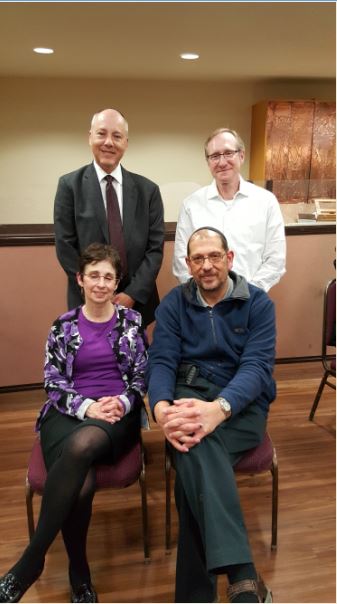Dr. Albert Kirshen said it’s just a matter of time before one of his patients asks him for assistance to die. Kirshen, an observant Jew who is a physician at the Temmy Latner Centre for Palliative Care at Mount Sinai Hospital, said he is bracing himself for the inevitable.
Kirshen is “personally conflicted” and struggling with the new Supreme Court-mandated policy that will permit physician-assisted death (PAD), he said, explaining that while the medical college will require him to accommodate a patient’s request to die, Jewish law does not permit him to make a referral for the termination of a life.
Kirshen spoke to the issue at a town hall meeting on “the implications of the proposed federal assisted suicide legislation on the practice of medicine,” held March 7 at Shaarei Shomayim Congregation in Toronto. About 300 people, many of them physicians, packed the shul’s social hall to learn more about the issue from an Orthodox perspective that reflected the views of rabbis, physicians and a legal expert.

Presenters included Kirshen; Dr. Nathan Herrmann, head of geriatric psychiatry at Sunnybrook Health Sciences Centre; Charles Wagner, a lawyer who specializes in estate and trusts; and Rabbi Mordechai Torczyner, rosh beit midrash, Yeshiva University Torah Mitzion Beit Midrash Zichron Dov.
Rabbi Chaim Strauchler of Shaarei Shomayim introduced the issues, Rabbi N. Daniel Korobkin of Beth Avraham Yoseph of Toronto Congregation (BAYT) gave closing remarks, and Dr. Janice Halpern, a psychiatrist affiliated with Mount Sinai and the University of Toronto, moderated the discussion.
Rabbi Strauchler explained that the town hall – jointly held by Shaarei Shomayim and the BAYT – was organized because many observant physicians have been approaching their rabbis to ask about their options as doctors and Jews as they confront the upcoming new legal reality, and they want to know how the Jewish community can address it.
“We are wrestling with difficult emotional and ethical challenges,” Rabbi Strauchler said. “Physicians are asked to control the dying process. They are gatekeepers of a new right to die.”
Although conscientious objection may be legal, he said there might be cultural pressure on physicians to comply with what could become the norm.
Wagner said the law must balance freedom of conscience, which is protected under the Charter of Rights and Freedoms, and a person’s legal right to die.
He explained that the Supreme Court’s landmark decision in 2015 (Carter vs. Canada) gives competent adults with intolerable medical suffering the right to seek physician assistance to die, as long as the patient’s consent is clear.
READ: TORONTO RABBINIC COUNCIL URGES POWER OF ATTORNEY ON HEALTH CARE
He pointed to the discrepancies between the Carter ruling and the more recent parliamentary report, which he likened to the European model of PAD.
While the American model is limited to severe, terminal illness, the parliamentary report has expanded the parameters of PAD to allow competent minors to terminate their lives after three years, as well as people with severe depression.
Herrmann said people with depression should not be candidates for PAD, because in most cases, depression can be treated with drugs and most people improve over time.
As well, advanced Alzheimer’s disease or other types of severe dementia should also not be criteria, even if people have given such directives, he said. While their quality of life may be limited to music and food, they’re not unhappy. “The vast number of patients do not suffer. Their families suffer.”
Kirshen told the physicians in attendance to start devising a strategy for dealing with the new reality. “You’re going to be asked, so be prepared by sorting out for yourself what your answer will be.”
He stressed the importance of investigating the reasons why a person would want to end his or her life without being judgemental. “Look for what makes the person vulnerable.”
When receiving a request to die, he said physicians should let their patients know their wishes will be respected.
He also advised physicians to keep written records of such encounters and to consult with colleagues and rabbis.
Rabbi Torczyner discussed several rabbinic opinions on PAD. He said according to one, physicians should not jeopardize their ability to make a living by refusing to make a referral for it, as they’re stipulated to do by their medical colleges.
READ: LIVING WITH HIV IN THE JEWISH COMMUNITY
“It’s not ideal… It doesn’t mean it’s morally permissible. It doesn’t mean we should welcome it,” Rabbi Torczyner said. “You don’t want all the observant physicians to resign. There’s a great communal need for observant doctors to serve.”
Rabbi Korobkin urged people to fight the legislation and oppose it publicly. “We are not yet at the point where the rules are set in stone… A society that sanctions death is not a society.”






